
The United States Army Special Operations Command (Airborne) (USASOC ( YOO-sə-sok)) is the command charged with overseeing the various special operations forces of the United States Army. Headquartered at Fort Liberty, North Carolina, it is the largest component of the United States Special Operations Command. It is an Army Service Component Command. Its mission is to organize, train, educate, man, equip, fund, administer, mobilize, deploy and sustain Army special operations forces to successfully conduct worldwide special operations.

MacDill Air Force Base is an active United States Air Force installation located 4 miles (6.4 km) south-southwest of downtown Tampa, Florida.
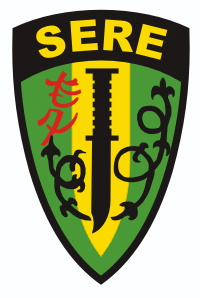
Survival, Evasion, Resistance, and Escape (SERE) is a training concept originally developed by the United States during World War II. It is best known by its military acronym and prepares a range of Western forces to survive when evading or being captured. Initially focused on survival skills and evading capture, the curriculum was designed to equip military personnel, particularly pilots, with the necessary skills to survive in hostile environments. The program emphasised the importance of adhering to the military code of conduct and developing techniques for escape from captivity. Following the foundation laid by the British, the U.S. Air Force formally established its own SERE program at the end of World War II and the start of the Cold War. This program was extended to include the Navy and United States Marine Corps and was consolidated within the Air Force during the Korean War (1950–1953) with a greater focus on "resistance training."

A police tactical unit (PTU) is a specialized police unit trained and equipped to handle situations that are beyond the capabilities of ordinary law enforcement units because of the level of violence involved. The tasks of a police tactical unit may include executing dangerous search warrants and arrest warrants for dangerous persons; arresting or neutralizing dangerous or mentally ill armed persons; and intervening in high-risk situations such as shootouts, standoffs, hostage-takings, and terrorist incidents.
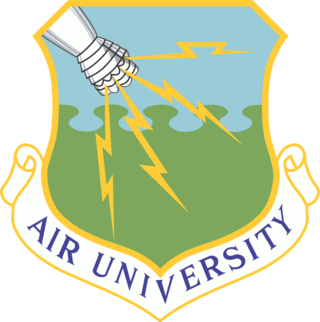
Air University is a professional military education university system of the United States Air Force. It is accredited by the Commission on Colleges of the Southern Association of Colleges and Schools to award master's degrees.

Canadian Special Operations Forces Command is a command of the Canadian Armed Forces. It is responsible for all special forces operations that respond to terrorism and threats to Canadians and Canadian interests around the world.
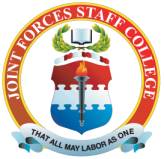
The Joint Forces Staff College (JFSC), located in Norfolk, Virginia, was established as the Armed Forces Staff College in 1946 and incorporated into the National Defense University in August 1981. It educates and acculturates joint and multinational warfighters to plan and lead at the operational level. Military operations increasingly require the Armed Services to work jointly, and JFSC provides students the tools to operate in a joint environment. JFSC is composed of three schools, each with different student populations and purposes.

The Air War College (AWC) is the senior Professional Military Education (PME) school of the U.S. Air Force. A part of the United States Air Force's Air University, AWC emphasizes the employment of air, space, and cyberspace in joint operations. Headquartered at Maxwell Air Force Base in Montgomery, Alabama, its higher headquarters is the Air Education and Training Command (AETC) at Randolph Air Force Base in San Antonio, Texas. It is one of six war colleges within the U.S. Department of Defense's Joint Professional Military Education (JPME) Phase II Education Program for commissioned officers.

The Air Command and Staff College (ACSC) is located at Maxwell Air Force Base in Montgomery, Alabama and is the United States Air Force's intermediate-level Professional Military Education (PME) school. It is a subordinate command of the Air University (AU), also located at Maxwell AFB, and is part of the Air Education and Training Command (AETC) headquartered at Randolph Air Force Base, Texas.

Joint Combined Exchange Training or JCET programs are exercises designed to provide training opportunities for American Special Forces by holding the training exercises in countries that the forces may one day have to operate in, as well as providing training opportunities for the armed forces of the host countries. Typically, each JCET program involved 10–40 American special forces personnel, though the number can sometimes be as high as 100. The United States Congress permitted the use of funds from the military budget to be used in overseas training such as JCETs in 1991, providing that the Secretary of Defense submits to Congress annually a report on overseas training activities.
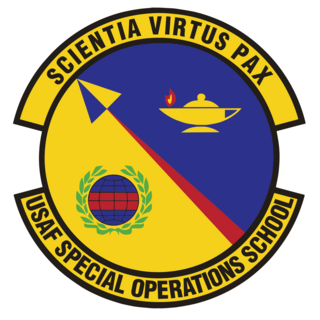
The United States Air Force Special Operations School (USAFSOS) is a school under the 492D Special Operations Wing, which falls under the Air Force Special Operations Command (AFSOC). AFSOC is the Air Force component of the United States Special Operations Command (USSOCOM).

Combat Rescue Officer (CRO) is a Special Warfare Officer career field in the United States Air Force. Its Air Force Specialty Code (AFSC) is 19ZXC and it was created to strengthen USAF Special Warfare personnel recovery capabilities by providing commissioned officer leadership that possessed an operational skillset paralleling that of the enlisted pararescuemen (PJ). The CRO specialty includes direct combatant command and control of Combat Search and Rescue (CSAR) operations. They plan, manage and execute the six tasks of CSAR: prepare, report, locate, support, recover, and reintegrate isolated personnel and materiel. CROs conduct strategic, operational and tactical level planning, provide battle staff expertise, manage theater personnel recovery operations and conduct combat special operations.

Marine expeditionary unit (special operations capable) (MEU(SOC)) is a program created by the United States Marine Corps (USMC) and the United States Navy (USN) in 1985 for Marine expeditionary units (MEU). The program enhances MEUs providing them with additional training and equipment to become certified as special operations capable with a Maritime Special Purpose Force (MSPF). The designation special operations capable is unique to the Marine Corps and means in relation to special operations. The role of a MEU(SOC) however is not equivalent to the special operations role of special operations forces. Although considered special operations capable a MEU(SOC) does not form part of the United States Special Operations Command (USSOCOM) established in 1987 or the United States Marine Forces Special Operations Command (MARSOC) later established in 2006.

Joint Professional Military Education (JPME) is a form of Professional Military Education (PME) in the United States that emphasizes a multiservice approach. Joint Professional Military Education was established following greater awareness during World War II of a need for effective cooperation between the branches of the United States armed forces. While some institutions had previously served to provide joint training, notably the Army and Navy Staff College that operated in the last years of the War, the first senior school for Joint Professional Military Education was founded in 1946 under the direction of the Chairman of the Joint Chiefs of Staff. The 1986 passage of the Goldwater–Nichols Act caused increased interest in Joint Professional Military Education and created a standard. As of 2005, JPME contains five levels, successful completion of two of which are among the qualifications for the designation Joint Service Officer. Joint Professional Military Education levels are available at a number of colleges and JPME Institutions.

The Special Forces Qualification Course (SFQC) or, informally, the Q Course is the initial formal training program for entry into the United States Army Special Forces. Phase I of the Q Course is Special Forces Assessment and Selection (SFAS). A candidate who is selected at the conclusion of SFAS will enable a candidate to continue to the next of the four phases. If a candidate successfully completes all phases they will graduate as a Special Forces qualified soldier and then, generally, be assigned to a 12-men Operational Detachment "A" (ODA), commonly known as an "A team." The length of the Q Course changes depending on the applicant's primary job field within Special Forces and their assigned foreign language capability but will usually last between 56 and 95 weeks.

All branches of the United States Armed Forces use the general term Enlisted Professional Military Education (EPME) to describe the formal system of education which each branch provides to its enlisted personnel. Each branch has its own system and sequence of courses, with the overall focus on leadership and management. Education generally increases in intensity and level of knowledge as individuals progress in rank and assume broader leadership roles. EPME is distinct from the technical training which service members receive for their Military Occupational Specialty (MOS), Air Force Specialty Code (AFSC), or Navy Rating.

United States Army Counterintelligence (ACI) is the component of United States Army Military Intelligence which conducts counterintelligence activities to detect, identify, assess, counter, exploit and/or neutralize adversarial, foreign intelligence services, international terrorist organizations, and insider threats to the United States Army and U.S. Department of Defense (DoD).
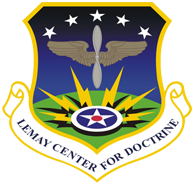
The Curtis E. LeMay Center for Doctrine Development and Education
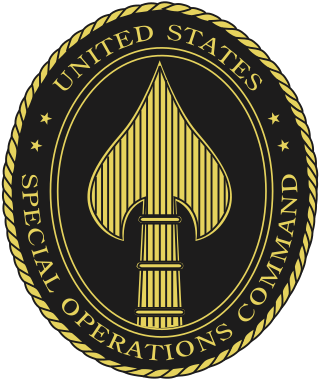
The United States Special Operations Command is the unified combatant command charged with overseeing the various special operations component commands of the Army, Marine Corps, Navy, and Air Force of the United States Armed Forces. The command is part of the Department of Defense and is the only unified combatant command created by an Act of Congress. USSOCOM is headquartered at MacDill Air Force Base in Tampa, Florida.
The Joint Command and Staff College (JCSC) is one of the colleges of the UAE armed forces that specialize in teaching the art of war in general and the operational art in particular. The JCSC combines theory and practice as a basis for its instructional methodology and aims to develop leadership qualities in the students. The JCSC contributes to forming the concept of employment for the armed forces in joint operations and military operations in peacetime, such as peacekeeping and peace support operations.



















